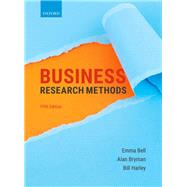Business Research Methods is the complete introduction to doing business research and an ideal guide for students embarking on a research project.
Developed specifically with business and management students in mind, this textbook explores the nature and purpose of business research and the issues it entails, while also providing students with practical advice through "Tips and Skills" boxes. In addition to a broad range of relevant examples, the book features a substantial discussion of ethics, and a strong emphasis on the most frequent challenges faced by students, such as choosing a research question, planning a project, and writing it up.
Fresh voices and perspectives run throughout this edition. New author, Bill Harley, further internationalizes the book's coverage, based on his expertise in the Australian business and management context. Also hear from an additional five students whose personal insights and advice in the 'student experience' feature help you avoid common mistakes, and follow their successful strategies when undertaking your own research project.
This edition has been extensively revised, updated, and streamlined. Coverage of E-Research is now woven
throughout the entire book to reflect the centrality of internet-based research methods.
The book is accompanied by a suite of online resources that include:
For students:
Multiple choice questions
Research Project guide
Interviews with students
Data sets
Using Excel in data analysis (in Excel)
Web links
For instructors:
Test bank
Discussion questions
PowerPoint slides
Lecturer's guide
Case studies
Figures and plates from the text
VLE cartridge








